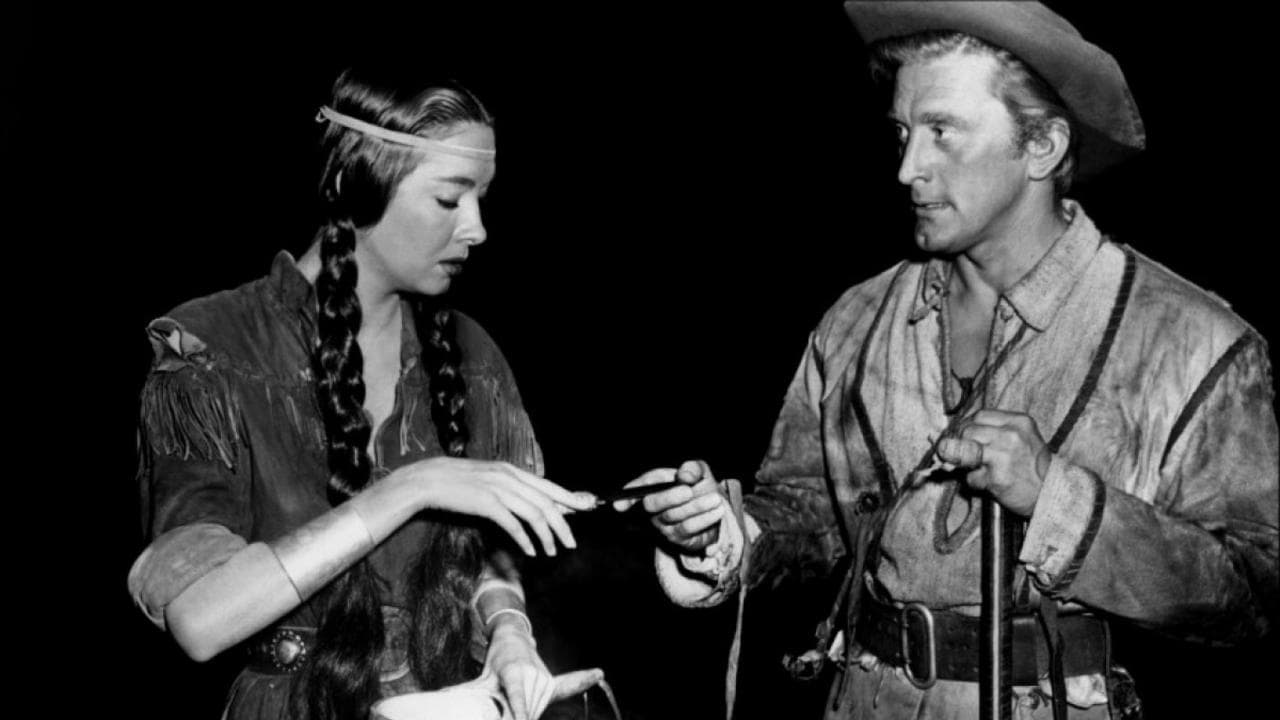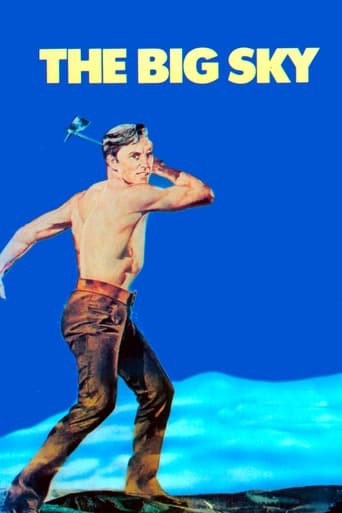

You won't be disappointed!
... View MoreAn action-packed slog
... View MoreVery good movie overall, highly recommended. Most of the negative reviews don't have any merit and are all pollitically based. Give this movie a chance at least, and it might give you a different perspective.
... View MoreIt's a good bad... and worth a popcorn matinée. While it's easy to lament what could have been...
... View MoreThis a surprisingly good movie.Here's what I liked:The story has a lot of heart. I completely bought the male bonding subplot between Jim and Boone. I especially fell for the friend/lover triangle between Jim, Boone and Teal Eye. Very well done. I even got a little weepy at the end, to be honest.Great underused historical time period i.e. the pre-Civil War trapper/explorer culture.Story was very authentic, from the river boating techniques, to the real French actors speaking actual French, to the Indians who didn't magically speak English.Great location shooting in Grand TetonsIn most Westerns the female character is gratuitous. Not here. Teal Eye is fully developed and is an active decision maker and taker of action in the plot. Pretty impressive that she is characterized so strongly as an Indian character. Even more impressive this is accomplished without a single line of dialog!!No plot holes. All characters are plausible and their actions are consistent.Nice supporting acting by Arthur Hunnicut, who was nominated for an Oscar for this, and Hank Worden, who has one of his better roles.The Indians were handled with sophistication. I'm not a big Kirk Douglas fan. I think he overacts and exudes narcissism. However, he underplayed his role nicely in this. It's only because his Hollywood star hadn't risen yet in 1952.Now here' s what kept it from being better:It's way too long. They should have cut out a number of subplots to move things along. I heard they made Hawks cut out another 20 minutes, which would have made it 3 and half hours! What was he thinking? A tragedy this was filmed in black and white. Technicolor was available. "Shane" was filmed in splendid color at the exact same location around the same time. I'm surprised these crews didn't run into each other. The print they are showing on TCM is absolutely awful. I hope a better print of this has survived somewhere.Dewey Martin was a weak co-lead as Boone.The heavies were underdeveloped, which made the film feel even longer than 3 hours.This could have been a top ten of all time movie if they had:1. Used a better actor for Boone. 2. Filmed in color 3. Cut out about an hour and fifteen minutes of useless subplots and used fifteen minutes to introduce a more charismatic heavy accompanied by a scary henchman.
... View MoreAlthough it only covers the first half of A. B. Guthrie's masterpiece novel of the same title---leaving out the very dark events of the second half---Howard Hawks' 1952 film version of THE BIG SKY is unique unto itself: it need not be compared with the novel, nor history itself. What it is, is an atmospheric impression of a keelboat voyage up the Missouri River of the 1830s into dangerous Blackfoot country. It is simply a beautifully lensed film: you can almost feel the river breezes on your face, the warm sun poking through the clouds, and the "skeeters" that pester Caudill, Calloway, Deakins and Poordevil as they scout the Jackson Hole wilderness. Don't look for probing examinations into human behavior here: most of the characters are surface-deep, and the story is really not all that remarkable. The costumes are little better than "ok" in terms of providing a credible idea of what was worn in those days, but of course the scholarship into this area is much more advanced now than it was in 1952, so the makers of the film can be forgiven. It's HOW Hawks tells and shows that story and its characters that makes this an unforgettable film. And the rivers, plains, forests and peaks of the American West have rarely been so lovingly "understood" on film as they are here. Other movies about trappers and mountain men, especially ACROSS THE WIDE MISSOURI and JEREMIAH JOHNSON, have moments that are wonderfully evocative of that era, but for me THE BIG SKY possesses the one scene that has never been bettered in terms of capturing the spirit of these men and their times. This occurs near the end, when Boone, Deakins, and Poordevil ride the crest of the bluff as they wave to the keelboat "Mandan" below. With the Grand Tetons looming magnificently behind them, and Dimitri Tiomkin's score lushly but understatedly highlighting the moment, the pure essence of those long-gone days is artfully, and beautifully conveyed. I first saw this film 45 years ago on television, and I never get tired of watching, and hearing, it. It has a certain magic that either touches you, or it doesn't. Fault-free it is not, but by the end of the voyage its virtues overwhelm those faults.
... View MoreOne of my favorite Kirk Douglas films is The Big Sky where he plays mountain man/trapper Jim Deakins. It's a great part for Douglas with his incredible charm and quick burn when someone does him wrong.The Big Sky was RKO Pictures big production for 1952. I'd like to say that Howard Hughes spared no expense in making this film, shooting a good deal of it in the Grand Tetons, the actual location for the adventures of many fur trappers. But for the life of me I don't understand why Hughes and RKO after doing that, didn't spring for color.Possibly because director Howard Hawks wanted black and white. His last epic film Red River had done well in black and white. Still I really think something was missed. RKO did use color on films with a lot less budget.There's a lot of similarity between The Big Sky and Red River. Both films involve a group of men on an epic journey into the unknown for business reasons. In Red River, John Wayne has to get that huge herd to market and has to use a trail few have used. In The Big Sky a group of independent trappers basically want to land a nice fur contract with the Blackfeet Indians where few whites have gone up the Missouri River. Going against them is a fur trading consortium kind of like the one John Jacob Astor put together.The trappers are mostly French Canadian Metis headed by Steven Geray, but also along is Arthur Hunnicutt who speaks the Indian language. Their ace in the hole is Elizabeth Threatt, a Blackfoot princess the trappers have rescued and are bringing back to her people in the hopes that her old man will be grateful. Hunnicutt is also the narrator of the film.Douglas and Dewey Martin join up with the group in St. Louis and the trappers have the usual adventures as they take the flatboat up into the Missouri River country. The scenes showing journey upriver are nicely photographed.Two others in the cast merit attention. Hank Worden does a nice job as a lost Blackfoot Indian who the trappers pick up. He may not be playing with a full deck, but he does come in handy. Jim Davis is one lean and mean villain as the company troubleshooter who wants to keep the independents out.Arthur Hunnicutt got an Oscar nomination for Best Supporting Actor for his role, The Big Sky proved to be his career film. Unfortunately he lost to Anthony Quinn for Viva Zapata. Still Hunnicutt's folksy charm was always something to look forward to in any film he was ever in.The Big Sky is one of the best films ever done about the mountain man era of the American frontier. If they'd only spent for color.
... View MoreOne of my favorites along side "The Bridge On The River Kwai". AMC had found some missing footage which surprised me a good while back. Too bad it and other scenes had been clipped, and it would be good to see it all sometime. No one mentions the scene where the Mandan is tied to the bank on a rest stop. The Frenchmen dance to the accordion. And "smack!!" an arrow lands, without computer enhancement, in the side of the Frenchman La Badie's neck played by Henri Letondal That was great archery from Howard Hill I bet! Slow it down a watch in slow motion! All the actors were born for "The Big Sky". The Tiomkin music score was superb. A Howard Hawks/Kirk Douglas/ Arthur "Arkansas" Hunnicutt/ Dewey Martin/ Elizabeth Threat/ Jim Davis/ Steven Geray movie for the ages. Oh, and not to forget Hank Worden as Poordevil,..Eee? Eeh! Heh!,....Heh!....Heh!,..Eeh!! Ever see a raven fly backwards? It's in the AMC added clip. Great movie recommended for all ages! Nice to read all the comments here!
... View More